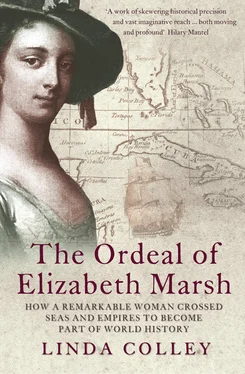But by now they are all lost: the other merchant ships, the Gosport that takes ten days to reach Lisbon, and the Ann that finally emerges from drifting in deep fog at 2 p.m. on 8 August to see ‘a sail to windward giving us chase and at half past seven came within pistol shot of us’. It is not – as they first think – a French warship. It is a twenty-gun Moroccan cruiser with more than 130 armed men on board. With flight now out of the question, Crisp and the Pophams agree to row over to the Moroccan vessel, thinking that it is simply a matter of showing their Mediterranean pass and establishing their identity, for Morocco and Britain are formally at peace. Elizabeth Marsh meanwhile was ‘tolerably easy, until night drew on, when fear seized my spirits, at their not returning at the time appointed. I continued in that state, until the morning … [when] instead of seeing the gentlemen, boats, crowded with Moors, came to our ship, in exchange for whom our sailors were sent on board theirs.’ She remains on the Ann four more days, as do the Moroccan boarders. Then, on 12 August, she is rowed over to their ship, terrified by ‘the waves looking like mountains’, because she is no longer observing them from the secure upper decks of a warship, and because – like most seafarers at this time – she is unable to swim. Once all are on board the corsair ship, there is a brutal social but not yet a gender divide. The ordinary sailors from the Ann are left roped together on deck. But James Crisp, Joseph Popham and his son, and Elizabeth are pushed into a cabin ‘so small as not to admit our standing upright. In this miserable place four people were to live.’ 21
During the three days she is confined here – and still more afterwards – what become significant are the things that she takes note of and is careful to remember, and the aspects of her ordeal and changing surroundings that she either refuses to acknowledge, or is in no position to understand. She is used to living at intervals at sea among hundreds of men, and so copes well with the utter lack of privacy, the discomfort, the smells, the stray glimpses of the others’ nudity, the glances they snatch of her own. ‘Miss Marsh’, Joseph Popham concedes later, ‘… has supported herself under her misfortunes beyond what may be expected from her tender sex.’ 22 It is not so much the embarrassments and hardships of being mewed up in a stinking cabin with three males that begin to undermine her, or even the shock of violent capture, so much as a sense of being torn from all moorings. She has grown up in tight, usually well-disciplined communities, the cherished only daughter of a respected master craftsman. Socially marginal in terms of British society in general, she has nonetheless been sure of her place in her own maritime sphere. As this strange, nightmarish ordeal progresses, her sense of personal anchorage loosens, and she feels marked out by her gender in new and dangerous ways.
She has already spent several days on the Ann surrounded by curious, occasionally ribald Moroccan seamen, with – or so she later records – only the ship’s elderly steward standing between her and them. Now, imprisoned on the corsair ship, William Popham tries to relieve his own fears by telling her ‘stories of the cruelties of the Moors, and the dangers my sex was exposed to in Barbary’. When they finally disembark at the port of Sla (Salé) on Morocco’s Atlantic coast on 15 August, and Elizabeth Marsh rides the mule they give her for two miles over rough tracks into its old town, she is greeted by ‘a confused noise of women’s voices from the top of the houses, which surprised me much, until I was informed it was a testimony of joy on the arrival of a female captive’. There are more reminders of her difference. As she, the Pophams and James Crisp wait in the half-ruined house allocated them, confined again to a single room, some local European merchants bribe their way in and undertake to smuggle out letters. The captives wait until night ‘lest the guards should suspect what we were upon’, and then they write. 23 Joseph Popham writes to a patron, Sir Henry Cavendish in Dublin, urging him to get his brother the Duke of Devonshire, a former Lord Lieutenant of Ireland, to intervene on the captives’ behalf. James Crisp writes to the new Governor of Gibraltar, James O’Hara, Baron Tyrawley, and to Sir Edward Hawke, who has replaced Byng as Commander-in-Chief of the British fleet in the Mediterranean. Both Popham and Crisp pass on personal messages in postscripts to their letters, but their first instinct is to make contact with public figures who are possessed of influence. When Milbourne Marsh finally learns of his daughter’s real plight (the newspapers initially report that the Ann has been seized or sunk by the French), he reacts in a similar fashion. He immediately, and with characteristic confidence, appeals for aid to the First Lord of the Admiralty, Lord Anson. Elizabeth Marsh by contrast has no contacts with powerful males at this stage of her life, and so writes only to her parents. Consequently her letters, unlike most of the others, do not survive. 24
Those who now have power over her also remind her of the vulnerabilities of her position. When the captives are taken for questioning before a high-ranking Moroccan official at Sla, James Crisp is able to converse with him in Spanish, the language that Maghrebi elite males and incoming Europeans often employ to communicate with each other. But Elizabeth, who knows little Spanish, is conducted into the official’s harem, ‘the apartment of his ladies’, and brought for the first time into the company of a Moroccan woman, whose name she never learns. With no interpreter available, they see each other – or so she claims later in print – only in terms of mutual strangeness:
She was surprisingly tall and stout, with a broad, flat face, very dark complexion, and long black hair. She wore a dress resembling a clergyman’s gown, made of muslin, and buttoned at the neck, like the collar of a shirt, which reached her feet. She had bracelets on her arms and legs; and was extremely inquisitive, curious in examining my dress and person, and was highly entertained at the appearance I made.
Whatever her own ancestry, Elizabeth Marsh will later stress for her readers this Moroccan woman’s ‘very dark’ skin. More significantly, she will parade her own Christian, Anglican faith by evoking a vicar’s surplice in her description of the Moroccan’s djellaba . 25 Yet, at the time, it is the possible resemblances between her plight and the situation of the other woman – not what divides them – that nag at her most. Both of them are confined in different ways; but what if, in the future, she herself comes to be immured in Morocco in a similar fashion to that of the other woman? It is someone who has access to both local Muslim and Christian societies, a slave called Pedro Umbert, who first puts this possibility into words. A Menorcan by birth, captured by corsairs and now the property of Morocco’s acting Sultan, Sidi Muhammad, Umbert has been ordered to Sla to negotiate with members of its European merchant community. 26 He is drawn to the captives because both Elizabeth Marsh and James Crisp can speak some Catalan, his cradle tongue, and having established their story, he urges them to replace one deception with another.
Since their capture, Crisp has been posing as Elizabeth’s brother ‘in order to be some little protection to me’. Now, Umbert warns them:
I should be in less danger of an injury, at Morocco, by his [Crisp] passing for my husband than my brother. My friend replied, he imagined I should be entirely safe, by his appearing in the character he then did; and, as he had been examined by the principal people of [Sla] concerning the truth of it, it was then too late to alter that scheme. The conversation then dropped, and he left us; but his advice, and the manner in which he had given it, greatly alarmed me. 27
Читать дальше












